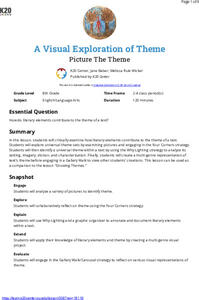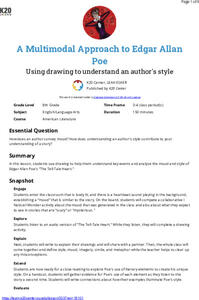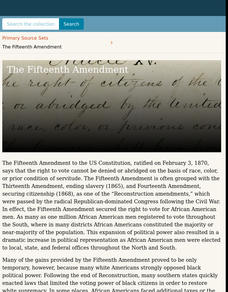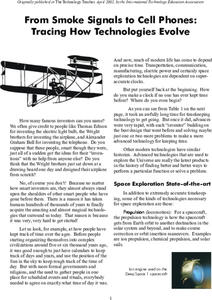PBS
Dr. Martin Luther King Jr.’s ‘I Have a Dream’ Speech as Visual Text
Young historians watch a video of Dr. Martin Luther King Jr. delivering his "I Have a Dream" speech and answer questions that test their knowledge of the event. After discussing the fact sheet, they reread the speech, select a phrase or...
K20 LEARN
Speak Your Truth: Techniques in Spoken Word Poetry
As part of a study of Spoken Word Poetry, class members watch a series of performance videos and note where poets get their ideas and the performance techniques used by the poets. Pupils then draft and share their poems.
K20 LEARN
It Wasn't Me: "The Crucible"
Scholars complete their study of the collective fear in Arthur Miller's "The Crucible" by conducting a mock trial to determine how many witches are in the class. Groups then analyze sections of the play for the literary devices used and...
K20 LEARN
Where I'm From: Poetry
We carry memories of where we're from; tweens and teens can capture these memories by first listening to several memory poems and then crafting their own. They analyze literary devices other poets use, brainstorm a list of images they...
Anti-Defamation League
Understanding and Analyzing “The U.S. of Us” by Richard Blanco
Current immigration issues and the rhetoric surrounding the controversies come into focus with a lesson that uses Richard Blanco's anthem, "The U.S. of Us," written after the August 2019 attack in El Paso, Texas, to open a discussion of...
K20 LEARN
Criminal Motivations: Irony and Characterization In "The Cask Of Amontillado"
Edgar Allan Poe's short story "The Cask of Amontillado" is a bit of a puzzle. Critics have long debated Montresor's motives for killing Fortunato. Young scholars examine examples of the three types of irony (verbal, dramatic, and...
K20 LEARN
A Visual Exploration Of Theme: Picture The Theme
"What is the theme of this story?" Now there's a question that can strike fear in the hearts of learners. Here's a lesson that uses photographs to introduce the concept of theme. Scholars examine six photographs and then attach a theme...
K20 LEARN
A Multimodal Approach To Edgar Allan Poe Using Drawing To Understand An Author's Style
True! Poe's "The Tell-Tale Heart" makes readers nervous. But how? Young scholars create a drawing while listening to a reading of Poe's eerie tale to understand how writers create the mood of their stories and what their writing style...
Penguin Books
A Teacher's Guide to the Signet Classic Edition of Charles Dickens's A Tale of Two Cities
It's not the best of guides nor the worst of guides, but time spent examining the guide to Charles Dickens's A Tale of Two Cities is certainly not wasted. The 17-page guide includes book-by-book synopses of the novel, before, during, and...
Penguin Books
A Teacher's Guide to the Penguin Edition of John Steinbeck's The Pearl
The guide to John Steinbeck's The Pearl suggests ways instructors can help readers see below the surface of the novella to the parable beneath. Through a variety of activities, readers come to appreciate the complexity of the tale.
Trinity University
Introduction to Poetry
Introduce fourth graders to poetry with a three-week unit that has them examine the structural elements of poetry, analyze poems, and craft their own original poems rich in sensory details and other poetic devices. Young scholars study...
Wadsworth Atheneum Museum of Art
Can Girls Do That?
Why be limited by stereotypes? Young scholars examine a series of works of art, list the different ways boys and girls are represented, and then discuss the common stereotypes found in the works. They then search for art that does not...
Wadsworth Atheneum Museum of Art
Where I'm From: Symbolism in Paint and Poetry
After a review of symbolism, class members use the provided worksheet to first list the objects they observe in Arnold Mesches' painting "Coney Island" and then suggest possible symbolic meanings for each of the objects. A second...
National Endowment for the Humanities
The Metamorphoses and Modern Poetry: A Comparison of Mythic Characters
To gain an appreciation of the power of point of view, class members compare Ovid's version of the myth of "Orpheus and Eurydice" with that used by H.D. in her poem, "Eurydice." Individuals then craft a reflection in which they use...
Learning for Justice
Maya Angelou
Maya Angelou's poem, "Still I Rise", offers young scholars an opportunity to consider how poets use literary devices to create powerful messages. After a close reading and discussion of the poem, class members reflect on how they can...
DocsTeach
The Process of Early Space Flight: The Gemini Program
Ideas take flight in an exciting activity on the NASA Gemini Program. Young scholars analyze photos from NASA's Gemini Program and place photos in the correct sequence of events. Academics also discuss the program and how the steps to...
DocsTeach
Integration of the US Armed Forces
Uncle Sam wants you to integrate the military! The activity uses images and documents to help scholars understand the integration of African Americans into the mainstream military. Academics analyze a series of military photos and...
Teach With Movies
The Great Gatsby
Are you thinking about incorporating a film version of F. Scott Fitzgerald's classic novel in a study of The Great Gatsby? Check out a guide loaded with suggestions for how to supplement a reading of the novel with scenes from three film...
Academy of American Poets
Poems about Poetry
Learners of all ages hear the words “Today we’re going to start poetry” and begin their plans to drop out of school. It is not the teacher's fault! Use this resource to help young scholars understand the genre of poetry and why it is...
EBSCO Industries
Music and Poetry
Song lyrics, like poems, are meant to be heard. After examining the literary devices in several poems, scholars examine the lyrics of popular songs and identify the sound devices and the figurative language writers use to create the...
Digital Public Library of America
The Fifteenth Amendment
Fifteen primary sources provide a context for a study of the Fifteenth Amendment to the United States Constitution. The packet captures the excitement for the changes promised by the amendment as well as the backlash against it.
Royal Shakespeare Company
King Lear Teacher Pack 2016
Disguises, deceptions, destruction. Thankless children, wise fools, aging rulers, and knaves. The Royal Shakespeare Company's 2016 King Lear Teacher Pack provides instructors with a wealth of resources for a study of Shakespeare's famous...
NASA
From Smoke Signals to Cell Phones: Tracing How Technologies Evolve
Explore the science of space exploration. Pupils consider technological advances in propulsion, communication, power, navigation, and imaging. They select one of these areas and create a timeline of historical progress that contributed...
EngageNY
Clarifying Thinking on Water Management: Revisiting the Gallery Walk
One, two, three, go! Scholars gather in triads and number themselves one to three. Each number is responsible for sharing a section of the map homework completed the night before as learners discuss domain-specific vocabulary terms using...

























